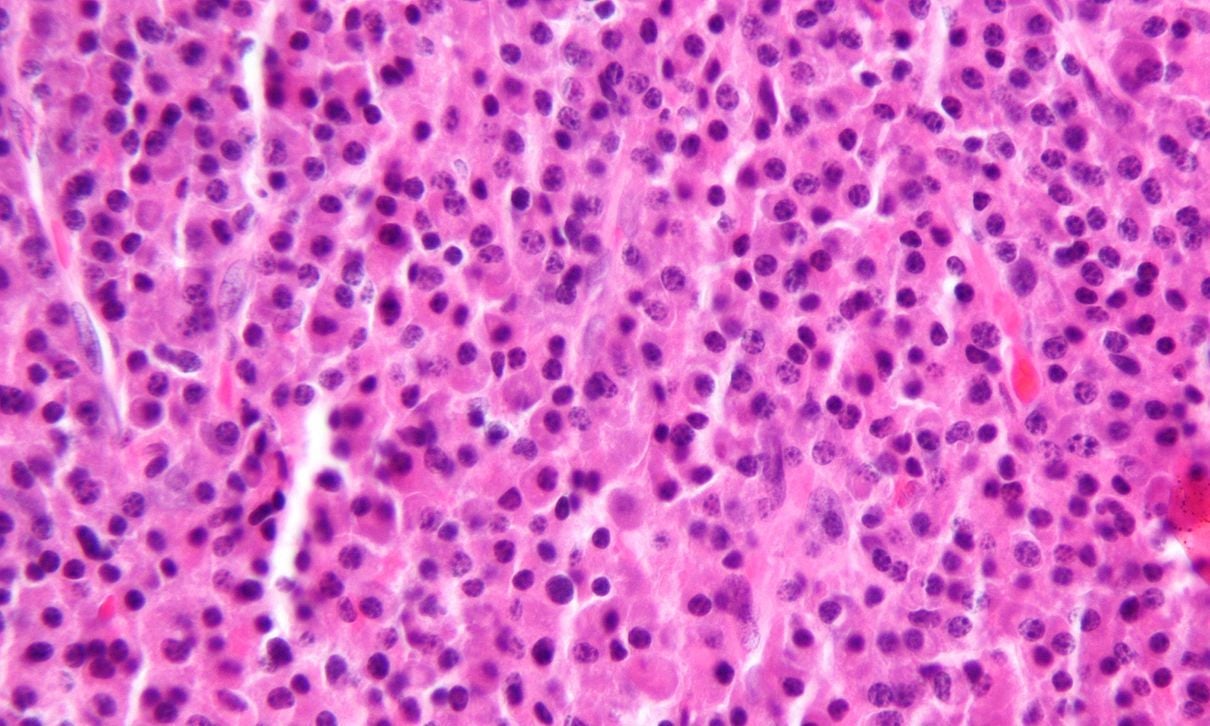
The micrograph shows abundant (malignant) plasma cells. Image credit: Copyright © 2009 Michael Bonert. Licence: CC BY-SA 3.0.
Researchers have identified a mechanism that may explain how a key genetic variant acts to increase the risk of developing myeloma.
It is hoped that research of this type will aid the discovery and development of effective new treatment strategies in myeloma.
This is the first time that the biological consequences of a novel genetic risk variant for myeloma has been investigated and deciphered in detail, with the results published in the prestigious journal Nature Communications, on Thursday 24 November 2016.
The research was principally funded by Myeloma UK, a national cancer charity that supports research into myeloma, and the discovery and development of new and innovative treatments for patients. Additional funding was provided by Bloodwise, Cancer Research UK, The Rosetrees Trust, Dietmar Hopp Foundation and the German Ministry of Education and Science.
It forms part of the myeloma research programme at The Institute of Cancer Research, London, and is the largest genetic study of its kind in myeloma that compares the genomes of healthy individuals with those of myeloma patients. To date it has identified 17 genetic risk variants for myeloma.
'Culprit' protein targeted
An important next step for the research programme is to understand exactly how the risk variant sequences can contribute to the chances of developing myeloma.
In these new findings, scientists at the ICR focused on a risk variant sequence found on chromosome 7 called rs4487645. The researchers found that myeloma risk is increased with rs4487645 through involvement of a protein called IRF4 which helps to switch on the production of another protein, CDCA7L. One of the downstream consequences of CDCA7L is increased cell growth involving an established ‘culprit’ protein in myeloma called Myc.
This latest research has provided a new angle on a complex pathway of proteins which increases myeloma risk when even moderately dysregulated.
Importantly, within this pathway are potential drug targets for prevention or treatment strategies. More research is needed to pursue these, and to understand the bases of other genetic risk variants associated with myeloma.
'An important step forward'
Study leader Professor Richard Houlston, Professor of Molecular and Population Genetics at the ICR, said: “Our study is an important step forward for research into myeloma, because it has started to untangle the complex biology that underlies the genetics of cancer risk.
"If we know exactly how a genetic variant operates to increase the risk of myeloma, we can start thinking about how we can exploit that information to improve treatments or to prevent the disease.”
Every year around 5,500 people in the UK are diagnosed with myeloma, a rare and incurable form of cancer affecting the plasma cells in bone marrow, and around one in 115 men and one in 155 women in the general population will develop myeloma in their life time.
Myeloma UK Director of Research Dr Simon Ridley comments: “It is very important to develop a greater understanding of the causes of myeloma, including the different genes and proteins that initiate and drive disease progression. From this we will increase our ability to find drugs to specifically target disease mechanisms.
“Our research strategy is focused on patient benefit. From discovery science through to clinical trials and healthcare delivery we work to ensure patient’s get access to the right treatment at the right stage of disease.”